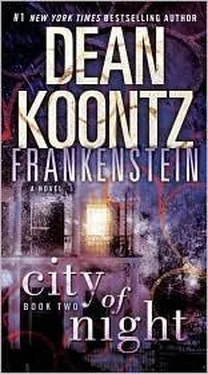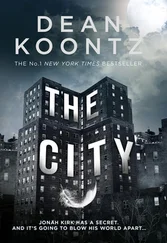“It is my fate to stop him,” Deucalion revealed. “To kill him.”
The color that had come into the priest’s cheeks now drained away. “Neither of us can raise our hands against him. Your broken face is proof of that.”
“We can’t. But others can. Those who are of man and woman born owe him no allegiance… and no mercy.”
The priest took more brandy-spiked coffee. “But we’re forbidden to reveal him, forbidden to conspire against him. Those commands are wired into us. We have no capacity to disobey.”
“Those proscriptions were not installed in me,” Deucalion said. “They no doubt came to him as an afterthought, perhaps on his wedding day two hundred years ago… when I murdered his wife.”
When Father Duchaine added brandy to his brew, the neck of the bottle rattled against the rim of the mug. “No matter who your god is, life is a vale of tears.”
“Victor is no god,” Deucalion pressed. “He is not even as little as a false god, nor half as much as a man. With his perverse science and his reckless will, he has made of himself less than he was born, has diminished himself as not even the lowliest beast in nature could abase and degrade itself.”
Increasingly agitated in spite of the brandy, Duchaine said, “But there’s nothing you can ask of me that I could do, assuming even that I might wish to do it. I cannot conspire .”
Deucalion finished his coffee. As it had grown cool, it had also grown more bitter. “I’m not asking you to do anything, neither to raise a hand nor to conspire against him.”
“Then why are you here?”
“All I want from you is what even a false priest can give to his parishioners many times in any day. All I ask is that you extend to me one little grace, one little grace, after which I’ll leave and never return.”
Judging by his ghastly expression, Father Duchaine had barely sufficient resources to make the revelation that now poured forth: “I’ve indulged in hateful thoughts about our maker, yours and mine. And only a couple nights ago, I sheltered Jonathan Harker here for a while. Do you know who he was?”
“The detective who turned killer.”
“Yes, all over the news. But what the news didn’t say… Harker was one of us. Both his psychology and his physiology were breaking down. He was… changing.” Duchaine shuddered. “I didn’t conspire with him against Victor. But I sheltered him. Because… because I do wonder sometimes about the Presence we discussed.”
“One little grace,” Deucalion persisted, “one little grace is all I ask.”
“What is it then?”
“Tell me where you were made, the name of the place where he does his work, and then I’ll go.”
Duchaine folded his hands before him, as if in prayer, though the posture more likely represented habit than devotion. He stared at his hands for a while and at last said, “If I tell you, there’s a thing I want in return.”
“What would that be?” Deucalion asked.
“You killed his wife.”
“Yes.”
“And so you, his first, were not created with a proscription against murder.”
“Only he is safe from me,” Deucalion said.
“Then I’ll tell you what you wish to know… but only if you give me a few hours to prepare myself.”
For a moment, Deucalion did not understand, and then he did. “You want me to kill you.”
“I’m not capable of asking such a thing.”
“I understand. But name the place for me now, and I’ll return whenever you wish to… finish our business.”
The priest shook his head. “I’m afraid that once you have what you want, you won’t return. And I need a little while to prepare myself.”
“Prepare in what way?”
“This may seem foolish to you, coming as it does from a false and soulless priest. But I want to say the Mass one last time, and pray, even though I know there is no reason I should be heard with a sympathetic ear.”
Deucalion rose from his chair. “I see nothing foolish in that request, Father Duchaine. It may be the least foolish thing that you could ask. When would you like me to return — two hours?”
The priest nodded. “It is not too terrible a thing I ask of you, is it?”
“I am not an innocent, Father Duchaine. I have killed before. And surely, after you, I will kill again.”
Lulana St. John and her sister, Evangeline Antoine, brought to Pastor Kenny Laffite two praline-cinnamon cream pies topped with fried pecans.
Evangeline had made two for her employer, Aubrey Picou. On his generous permission, she had made two extra for their minister.
Mr. Aubrey had expressed the desire to eat all four of these pies himself but had acknowledged that to do so would be gluttony, which was — to his recent surprised discovery — one of the seven deadly sins. Besides, poor Mr. Aubrey had periodic intestinal cramps that might not be exacerbated by two of these rich delights but surely would bring him to total ruin if he inflicted four upon himself.
Lulana’s and Evangeline’s work day was over. Their brother, Moses Bienvenu, had gone home to his wife, Saffron, and their two children, Jasmilay and Larry.
In the late afternoon and evening, the only person attending to Mr. Aubrey was Lulana’s and Evangeline’s and Moses’s brother, Meshach Bienvenu. Like a mother hen looking after her chick, good Meshach would see that his employer was fed and comfortable and, as far as was possible for Mr. Aubrey, righteous.
The sisters came often with gifts of baked goods for Pastor Kenny because he was a wonderful man of God who had been a blessing to their church, because he had a healthy appetite, and because he was not married. At thirty-two, truly devout, charming enough, and handsome by some standards, he was a better catch than a double tubful of catfish.
Romantically speaking, neither sister had a personal interest in him. He was too young for them. Besides, Lulana was happily married, and Evangeline was happily widowed.
They had a niece, however, who would make the perfect wife for a man of the cloth. Her name was Esther, the daughter of their eldest sister, Larissalene. As soon as Esther completed the remaining three months of a sixteen-month course of extensive dental work to correct an unfortunate condition, the sweet girl would be presentable.
Lulana and Evangeline, with a storied history of successful matchmaking, had prepared the way for Esther with scrumptious pies and cakes, cookies and breads and muffins: a more certain path than one paved with palm leaves and rose petals.
Next door to the church, the parsonage was a charming two-story brick house, neither so grand as to embarrass the Lord nor so humble as to make it difficult for the congregation to attract a preacher. The front porch had been furnished with bentwood rocking chairs with cane backs and seats, made festive with hanging baskets of moss from which grew fuchsia with cascades of crimson and purple flowers.
When the sisters, each with a fine pie, climbed the porch steps, they found the front door wide open, as Pastor Kenny most often left it when at home. He was a most welcoming kind of churchman with a casual style, and outside the holy service, he was partial to white tennis shoes, khakis, and madras shirts.
Through the screen door, Lulana could not see much useful. The late twilight of midsummer lay at least half an hour away, but the sunshine was already rouge, and what rays penetrated the windows did little more than brighten black shadows to purple. Toward the back, in the kitchen, a light glowed.
As Evangeline reached to press the bell push, a startling cry came from within the parsonage. It sounded like a soul in misery, rose in volume, quavered, and faded.
Читать дальше












